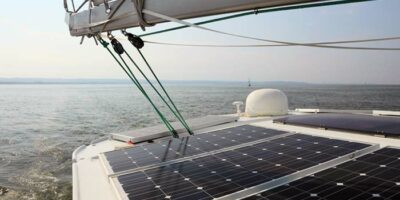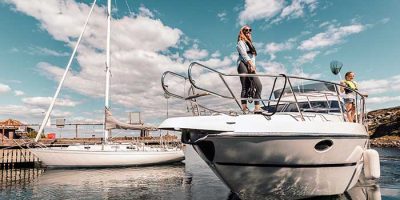Wiring
Dive into the key considerations for boat wiring. Learn about corrosion prevention, proper wire sizes, and the significance of special wires.
- January 29, 2024
Wiring is not difficult, but there are some special considerations afloat. Corrosion is a major problem. That’s why we suggest you only use marine-grade tinned wire and cable. It lasts longer and provides better service in the process. We also suggest that you use a crimper rather than solder for connections. A good crimping kit is inexpensive, convenient, and easily replenished with new connectors. When you “heat shrink” crimped connections, you’ve made a permanent fix.
Wire size is important, too. Some power loss occurs in virtually every wire – but like plumbing and water pressure, the bigger the carrier, the less the power loss. For electric motors and critical uses (bilge pumps, electronics, navigation lights, etc.) we suggest no more than 3% voltage drop at the appliance. For cabin lights, etc., 10% is acceptable. The ABYC recommends wire conductors of at least 16-AWG (gauge) for lights and other similar equipment. That’s minimum, and heavier gauge isn’t much more expensive — and generally no more trouble to install. We suggest you use 12- or 14-AWG to minimize your voltage drops, or more if the manufacturer suggests it. Big bilge pumps may require as much as 10-AWG for reliability and long life (motors fail earlier when run at low voltage).
Remember, the longer your wire run and the smaller your wire size, the greater the voltage drop you will experience. Conversely, the shorter your wire run and the larger your wire size, the smaller the voltage drop you will experience. Use the shortest run and the largest diameter (largest wire guage size) wire you can to reduce the voltage drop.
Anchor windlasses are a particular challenge for 12v systems. These motors are much like automobile starters, and use tremendous amounts of current. Follow the manufacturer’s recommendations on wire sizes completely! Don’t use welding cable! A possible alternative to long supply cables for the windlass is the placement of a dedicated battery near the windlass. Then smaller connectors from the charging system to the battery can make the longer run.
Run your connectors as high as you can and try to keep electrical connectors away from compasses and sensitive electronic components (such as electronic compass sensors). If you can’t avoid it, use twisted pair conductors within three feet of these devices. This avoids creating a magnetic field from current flow. You don’t have to follow industry standards of color coding, of course, but it will enhance the value of your boat when it comes time to sell (and survey). And it makes troubleshooting much easier.
4 Important Points To Consider When Working On Your Electrical System
- All marine electrical equipment must have a breaker or fuse to protect your wiring as well as the product. Don’t use breakers or fuses larger than those recommended by the manufacturer, or you may find yourself with “fried” equipment.
- Don’t tap into other wires, no matter how tempting! Go directly to a positive terminal block and circuit breaker, as well as directly to a grounding buss.
- Turn off all power before starting any work.
- Maintaining good grounds is critical. Avoid unnecessary stray current.
BoatUS Editors
Contributor, BoatUS Magazine
About Vessel Vanguard
Vessel Vanguard is a leading marine safety and maintenance management software provider dedicated to revolutionizing the maritime industry. With a commitment to innovation and excellence, Vessel Vanguard delivers cutting-edge solutions to streamline operations and enhance vessel performance and safety.
Latest Industry Insights

Embracing E-Boating Efficiencies

Boat Fuel Systems

The Future of Boats & Boating

Yacht Navigation Light Inspection
View All of Our Industry Insights
Navigate maritime with the latest news, practical how-to guides, insightful analyses and more.
